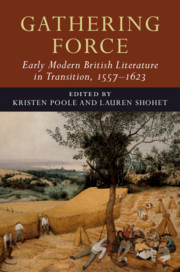19 results
Copyright page
-
- Book:
- Gathering Force: Early Modern British Literature in Transition, 1557–1623
- Published online:
- 12 January 2019
- Print publication:
- 17 January 2019, pp vi-vi
-
- Chapter
- Export citation
Chapter 4 - Pageants, Masques, and Entertainments: Old Rituals, New Forms
- from Part I - Generic Transitions
-
-
- Book:
- Gathering Force: Early Modern British Literature in Transition, 1557–1623
- Published online:
- 12 January 2019
- Print publication:
- 17 January 2019, pp 69-87
-
- Chapter
- Export citation
Contents
-
- Book:
- Gathering Force: Early Modern British Literature in Transition, 1557–1623
- Published online:
- 12 January 2019
- Print publication:
- 17 January 2019, pp ix-xi
-
- Chapter
- Export citation
Part IV - Literature and Local Transformation
-
- Book:
- Gathering Force: Early Modern British Literature in Transition, 1557–1623
- Published online:
- 12 January 2019
- Print publication:
- 17 January 2019, pp 285-372
-
- Chapter
- Export citation
Acknowledgements
-
- Book:
- Gathering Force: Early Modern British Literature in Transition, 1557–1623
- Published online:
- 12 January 2019
- Print publication:
- 17 January 2019, pp xx-xx
-
- Chapter
- Export citation
Introduction
-
-
- Book:
- Gathering Force: Early Modern British Literature in Transition, 1557–1623
- Published online:
- 12 January 2019
- Print publication:
- 17 January 2019, pp 1-16
-
- Chapter
- Export citation
Illustrations
-
- Book:
- Gathering Force: Early Modern British Literature in Transition, 1557–1623
- Published online:
- 12 January 2019
- Print publication:
- 17 January 2019, pp xii-xiii
-
- Chapter
- Export citation
Part III - Literature and Cultural Transformation
-
- Book:
- Gathering Force: Early Modern British Literature in Transition, 1557–1623
- Published online:
- 12 January 2019
- Print publication:
- 17 January 2019, pp 197-284
-
- Chapter
- Export citation
Contributors
-
- Book:
- Gathering Force: Early Modern British Literature in Transition, 1557–1623
- Published online:
- 12 January 2019
- Print publication:
- 17 January 2019, pp xiv-xix
-
- Chapter
- Export citation
Index
-
- Book:
- Gathering Force: Early Modern British Literature in Transition, 1557–1623
- Published online:
- 12 January 2019
- Print publication:
- 17 January 2019, pp 373-398
-
- Chapter
- Export citation
Dedication
-
- Book:
- Gathering Force: Early Modern British Literature in Transition, 1557–1623
- Published online:
- 12 January 2019
- Print publication:
- 17 January 2019, pp vii-viii
-
- Chapter
- Export citation
Part II - Literature and Ideological Transformation
-
- Book:
- Gathering Force: Early Modern British Literature in Transition, 1557–1623
- Published online:
- 12 January 2019
- Print publication:
- 17 January 2019, pp 107-196
-
- Chapter
- Export citation
Abbreviations
-
- Book:
- Gathering Force: Early Modern British Literature in Transition, 1557–1623
- Published online:
- 12 January 2019
- Print publication:
- 17 January 2019, pp xxi-xxii
-
- Chapter
- Export citation
Part I - Generic Transitions
-
- Book:
- Gathering Force: Early Modern British Literature in Transition, 1557–1623
- Published online:
- 12 January 2019
- Print publication:
- 17 January 2019, pp 17-106
-
- Chapter
- Export citation

Gathering Force: Early Modern British Literature in Transition, 1557–1623
-
- Published online:
- 12 January 2019
- Print publication:
- 17 January 2019
Wendy R. Olmsted. The Imperfect Friend: Emotion and Rhetoric in Sidney, Milton, and Their Contexts. Toronto: University of Toronto Press, 2008. xii + 294 pp. index. $60. ISBN: 978–0–8020–9136–9.
-
- Journal:
- Renaissance Quarterly / Volume 63 / Issue 1 / Spring 2010
- Published online by Cambridge University Press:
- 20 November 2018, pp. 315-316
- Print publication:
- Spring 2010
-
- Article
- Export citation
Martin Butler. The Stuart Court Masque and Political Culture. Cambridge: Cambridge University Press, 2009. xiii + 447 pp. index. append. illus. tbls. $115. ISBN: 978–0–521–88354–2.
-
- Journal:
- Renaissance Quarterly / Volume 63 / Issue 1 / Spring 2010
- Published online by Cambridge University Press:
- 20 November 2018, pp. 344-345
- Print publication:
- Spring 2010
-
- Article
- Export citation
William Kuskin, ed. Caxton's Trace: Studies in the History of English Printing. Notre Dame, IN: University of Notre Dame Press, 2006. Pp. xxvii+394. $60.00 (cloth).
-
- Journal:
- Journal of British Studies / Volume 46 / Issue 1 / January 2007
- Published online by Cambridge University Press:
- 21 December 2012, pp. 149-151
- Print publication:
- January 2007
-
- Article
- Export citation
The Banquet of Scotland (PA)
-
-
- Book:
- Shakespeare Survey
- Published online:
- 28 March 2007
- Print publication:
- 25 November 2004, pp 186-195
-
- Chapter
-
- You have access
- Export citation



